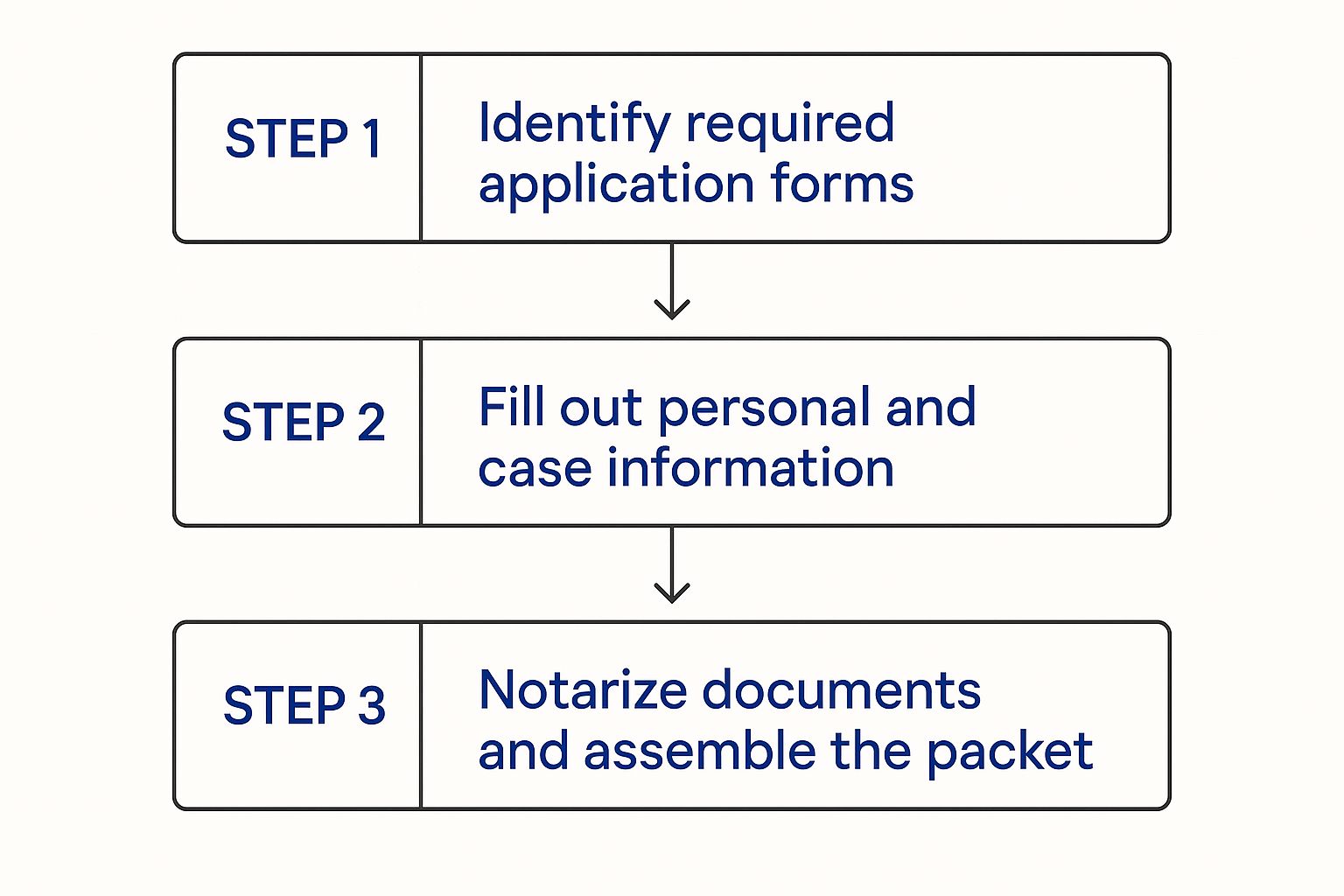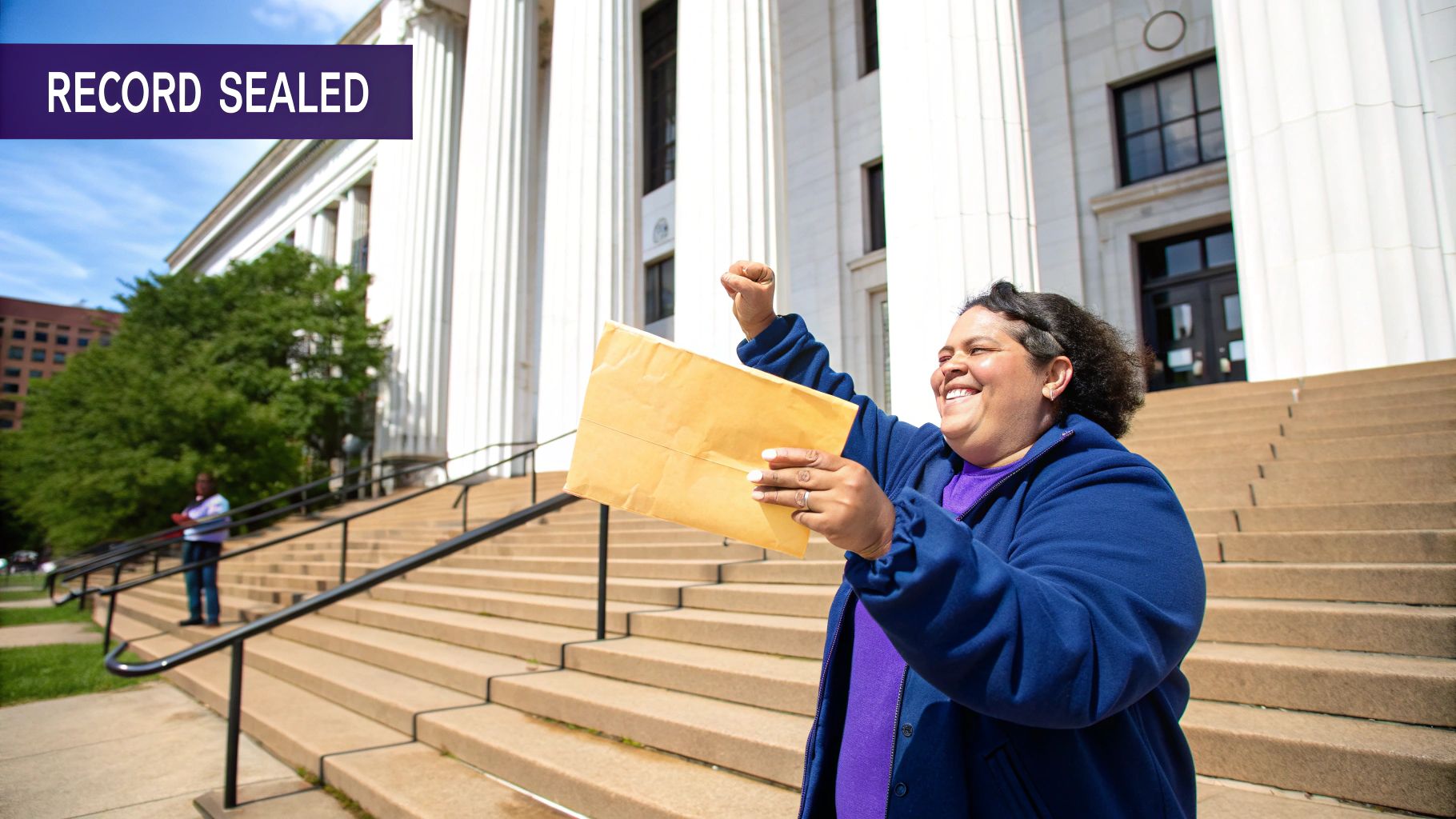How to Seal Your Record in Nevada: Step-by-Step Guide
- WebsiteFix Technical Partner
- Jun 30
- 13 min read
So, you're looking to seal your criminal record in Nevada and get a true fresh start. It's a powerful step that can completely change your future, opening doors to better jobs, housing, and just the simple peace of mind that comes with putting the past behind you.
Let's walk through what this process actually looks like. It’s not just about filling out a form; it's about understanding the specific legal path Nevada has laid out.
Your Path to a Clean Slate in Nevada

Moving beyond a criminal charge in Nevada involves a very specific legal process called record sealing. Think of it as making your old criminal history invisible to the public. For all practical purposes, when a potential employer, landlord, or school runs a background check, that old charge simply won't be there.
It's important to know that sealing isn't the same as expungement, where a record is physically destroyed. In Nevada, sealing restricts access. But for you, the outcome is what matters: a genuine fresh start. The benefits are real and can have an immediate impact on your life.
First Things First: The Waiting Periods
Before you can even think about filing paperwork, you have to wait. Nevada law requires a mandatory waiting period for nearly every type of offense, and this clock doesn't start ticking until your case is completely closed.
What does "closed" mean? It means you've done everything the judge ordered. You've finished your probation, paid every last cent of your fines, and completed any required classes or community service.
A critical point: The waiting period countdown begins the day after you've fulfilled every single condition of your sentence. If you finished probation a year ago but just paid off the last of your court fees yesterday, your waiting period starts today.
These waiting periods are set by law and depend entirely on the seriousness of the charge. Here’s a quick overview of what you can expect.
Nevada Record Sealing Waiting Periods at a Glance
This table breaks down the waiting periods you must complete after your case is officially closed. Remember, this is the time you have to wait before you can petition the court.
Offense Category | Waiting Period After Case Closes |
|---|---|
Category B, C, or D Felonies | 5 years |
Category E Felonies | 2 years |
Gross Misdemeanors | 2 years |
Misdemeanors (including Misdemeanor DUI) | 1 year |
Acquittals or Dismissals | No waiting period |
Honorable Discharge from Probation | No waiting period |
As you can see, the timelines vary quite a bit. It’s also crucial to understand that some convictions can never be sealed in Nevada. This includes DUIs that caused injury or death, most sex offenses, and any crimes committed against a child. For more details, you can dig into Nevada's record-sealing laws to see the exact statutes.
What Happens After Your Record Is Sealed?
Once a judge approves your petition and signs the order, it's sent to all the law enforcement agencies that have a record of your case. They are legally required to seal those records from public view.
This is where the real-world benefits kick in. When your record is sealed, you can legally and honestly say "no" when asked if you've ever been convicted of that crime on an application.
Here’s what that really means for your life:
Better Job Prospects: You can apply for jobs that were out of reach because of background check policies.
More Housing Options: Your rental application is much more likely to be approved without a conviction holding it back.
Personal Freedom: Sealing your record can help restore certain civil rights and, just as importantly, remove the social stigma that follows you long after you've served your time.
Getting these fundamentals right from the start is the key to successfully navigating the process and finally moving forward.
Are You Actually Eligible to Seal Your Record?

Before you spend a dime or an ounce of emotional energy on this, you have to be sure you actually qualify. This isn't just a simple checkbox exercise; Nevada's rules for sealing records have specific twists and turns that can easily derail an application. So, the very first step in learning how to seal your record in Nevada is doing a serious self-audit to make sure you meet every single requirement.
The most basic rule? Your case must be officially "closed." This means you've done everything the court ordered—finished your probation, completed parole, paid every last fine, and settled all restitution. I've seen petitions get thrown out over a tiny outstanding balance, so make sure everything is truly settled.
Nevada’s Tough “All-or-Nothing” Rule
Here's something you absolutely need to understand: Nevada law takes an "all-or-nothing" stance on sealing records. You don't get to pick and choose which offenses to hide. If you have just one conviction on your record that's ineligible, your entire petition gets denied. That means nothing gets sealed.
Let’s say you have a gross misdemeanor theft conviction from 5 years ago, which is now eligible. But if you also have a more recent conviction for a Category A felony that can never be sealed, you’re out of luck. You can't seal the theft charge. That ineligible felony acts like an anchor, holding your entire record down.
This is why you must review your entire criminal history, not just the one charge you’re focused on. A single disqualifying offense will stop the whole process in its tracks.
Waiting Periods and Permanent Disqualifications
The waiting periods are set in stone and start the day after your case is completely closed. You'll need to wait 1 year for most misdemeanors, while different felonies can require waiting periods from 2 to 10 years. During that time, you cannot get convicted of anything else. A new conviction resets the clock.
Unfortunately, some convictions will permanently disqualify you from ever sealing your Nevada record. It's critical to know if any of these are on your history.
Common Offenses That Can't Be Sealed:
Crimes Against Children: Any felony or misdemeanor against a minor is almost always ineligible.
Certain Sex Offenses: If an offense requires you to register as a sex offender, it likely can't be sealed.
Felony DUI: A DUI charged as a felony, especially one that caused serious injury or death, is a permanent barrier.
Home Invasion with a Deadly Weapon: This is a specific violent crime that Nevada law excludes from sealing.
Many of the documents you'll need, like your criminal history report and the final court disposition, will become part of your formal petition. Getting these documents handled correctly is a huge part of the process. If you need help with getting documents properly witnessed and verified, it's wise to understand what a professional can do. You can find various services, including those from a **Nevada notary**, to ensure your paperwork is legally sound and ready for court.
Getting Started: Navigating the Nevada Record Sealing Process
Alright, you’ve figured out you're eligible to seal your record. Now comes the part where we roll up our sleeves and get to work on the actual paperwork. This might seem intimidating, but if you break it down into a few key steps, it's far more manageable. The whole point is to put together a petition package that’s spot-on accurate and complete.
First things first, you need to gather all your official documents. Don't rush this part. I've seen plenty of petitions get delayed or even rejected because of a single missing piece of information. You'll need to get your hands on an up-to-date copy of your entire criminal history and the final court paperwork for every single case you want to seal.
Assembling the Core Paperwork
The foundation of your entire petition rests on official records. There are two critical documents you must get before you do anything else:
Your Criminal History Report (SCOPE): Think of this as your official rap sheet from the Nevada Department of Public Safety. It lists every arrest, every citation—everything on your record in the state. To get it, you'll need to be fingerprinted and pay a small fee.
Court Disposition Documents: For each case you’re sealing, you need the official document from that specific court showing how it ended. This paper proves whether the case was dismissed, what you were convicted of, and, crucially, the exact date the case was closed.
Give yourself a few weeks for this, as getting these records isn't instant. These documents are the hard evidence that will back up every claim you make in your petition.
A critical piece of advice I always give my clients: The information in your petition must match your official records perfectly. Even a tiny mistake, like a wrong case number or an incorrect date, can give the prosecutor's office a reason to object or cause the court to toss out your filing entirely.
Drafting Your Petition to Seal Records
With your SCOPE and court dispositions in hand, you can start drafting the main legal document: the Petition to Seal Records. This is your formal request to the court, laying out who you are, which specific records you want sealed, and the legal reasons why you're eligible.
This is where things can get tricky and where many people trying to do this on their own run into trouble. The petition demands absolute precision. You have to list every arrest, charge, and case—don't forget the arresting agency, the court, and the final outcome. If you forget about a minor traffic citation that was dismissed years ago, you could run afoul of Nevada's "all-or-nothing" rule, which could get your entire petition denied.
This image shows how the process flows from gathering your info to getting everything properly signed and ready to go.

As you can see, it’s a methodical process of finding the right forms, filling them out with total accuracy, and then making them official with a notary's stamp.
After drafting the petition, you’ll also prepare a proposed Order to Seal Records. You're essentially doing the judge's work ahead of time by creating the very document you hope they'll sign. Many of these forms require notarization, which is how you formally swear that your statements are true. If you need help ensuring this is all done correctly, professional **document preparation and notary services** can be a lifesaver.
Filing and Serving Your Petition
Once your entire packet—the petition, the proposed order, and all your supporting documents—is complete and notarized, it's time to file it with the correct court. This must be the Justice or District Court that handled the original charges.
But you're not done yet. After filing, you have to legally notify the District Attorney's office by "serving" them a copy of everything. They have the right to look over your request and object if they find a reason you aren't eligible or if they believe the public's interest in seeing your record is more important than your right to privacy.
If the DA doesn't file an objection, the judge will most likely review your paperwork and sign the order without you ever having to step into a courtroom. If they do object, however, the court will schedule a hearing. At that point, you'll need to be prepared to stand before the judge and argue why you deserve this fresh start.
What to Expect: The Costs, Timeline, and Potential Roadblocks
Getting your record sealed in Nevada is a marathon, not a sprint. Before you dive in, it’s smart to get a clear picture of what the process really involves—both in terms of money and time. Knowing what’s ahead helps you set realistic expectations and avoid surprises that could derail your efforts.
It's not just about one big fee or a single waiting period. The process is a series of smaller steps, each with its own cost and timeline. Let's break it down so you can plan effectively.
What Does Sealing a Record Actually Cost?
The total price tag for sealing a record isn't set in stone; it can shift a bit depending on your specific case and the county where you file. However, there are a few standard fees you can count on paying. Think of these as the required costs to get your paperwork through the official channels.
Here's a look at the typical expenses you'll likely run into.
Estimated Costs for Sealing a Record in Nevada
Expense Item | Typical Cost Range |
|---|---|
Criminal History Report (SCOPE) | $20 – $30 |
Court Filing Fee | $200 – $300 (can vary by court) |
Serving Documents | $25 – $75 (if using a process server) |
Notary Fees | $5 – $15 per signature |
Certified Copies of Order | $10 – $20 |
These are just the baseline government and service fees. If the legal paperwork feels overwhelming and you want to ensure everything is done right the first time, investing in professional help is a great move. You can find experienced help with **document preparation services** to make sure your forms are accurate and meet all the court's strict requirements.
How Long Does This Whole Process Take?
Patience is your best friend here. From the day you first file your petition to the moment you get that final signed order from the judge, you're usually looking at a timeline of three to six months. In some cases, especially if complications pop up, it can take even longer.
Once your petition is filed, the clock starts for the District Attorney's office. They have a specific window of time to review your case and decide if they're going to fight it. If there's no objection, things can move along fairly quickly, and the judge might sign the order without a fuss. But if the DA does object, a court hearing will be scheduled, which definitely adds more time to the calendar.
Expert Tip: Getting the judge's signature isn't the final step. The signed Order to Seal Records must then be sent to every law enforcement agency that has a record of your case. It can take these agencies anywhere from 30 to 120 days to actually scrub your record from their systems. Don't panic if it doesn't disappear overnight.
Common Hurdles That Can Trip You Up
Even if you're perfectly eligible, small mistakes can cause major delays or even get your petition denied. I’ve seen it happen. Knowing the common pitfalls ahead of time is the best way to avoid them.
Sloppy Paperwork: This is the number one reason for rejection. A typo in a case number, forgetting to list a charge (even if it was dismissed), or a misspelled name can get your petition bounced right back to you. Double-check everything. Then triple-check it.
Forgetting to Notify Someone: The law is very clear: you must formally notify (or "serve") the right government agencies. If you miss one, the process stops dead in its tracks until you fix it.
The Prosecutor Objects: This is the biggest potential roadblock. The District Attorney can object if they argue you're not eligible or that sealing your record goes against the public’s best interest. If this happens, you'll have to go to court and argue your case before a judge.
By understanding these challenges from the start, you're in a much better position to navigate the process smoothly and finally get the clean slate you've been working toward.
Life After Your Record Is Sealed
Getting your record sealed is a huge victory, but what does it actually change in your day-to-day life? The most powerful and immediate difference comes down to one question: "Have you ever been convicted of a crime?"
Once a judge signs that order and it gets processed, you can legally and honestly say "no." For almost every practical purpose, the conviction is gone from public view. This single fact can completely change your future, opening doors that were firmly shut before. Imagine the relief of applying for a new job or apartment without that sinking feeling in your stomach, confident that a background check won't derail your chances. It's a true fresh start.
Who Can Still See Your Sealed Record?
Now, it's important to understand that "sealed" doesn't mean "shredded." While your record becomes invisible to the public—that means most employers, landlords, and nosy neighbors—it isn't completely erased from existence. A handful of specific government agencies can still access these records, but only under very specific circumstances.
Knowing who's on this list helps manage expectations. The list is short and highly specific:
Law Enforcement and Prosecutors: If you find yourself being investigated for a new crime, they can and will see your sealed offenses.
The Nevada Gaming Control Board: This is a big one here in Nevada. If you're applying for a gaming license, expect them to see your full history.
Certain Professional Licensing Boards: Agencies that oversee sensitive fields like nursing, law, or education may be able to access sealed records when determining your fitness for a license.
For the vast majority of people, these exceptions never become an issue. Your sealed record is effectively gone, allowing you to move forward without being held back by a past mistake.
Verifying Your Record Is Actually Sealed
After the judge signs the order, it gets sent out to a list of state and local agencies—the Nevada Department of Public Safety, the FBI, the arresting police department, and so on. This isn't instantaneous. It can take anywhere from 30 to 120 days for all of these different databases to get updated.
This is why you absolutely must follow up. Don't just assume it's done. A few months after you have the signed order in hand, it’s a smart move to run a background check on yourself to confirm the old case is no longer showing up.
If you find that an old charge is still visible, don't panic. This is usually just a clerical delay. Get your signed Order to Seal Records and contact the agency that's still reporting the information. Providing them with a copy of the court order is typically all it takes to fix the problem and secure the fresh start you worked so hard for.
Common Questions About Sealing Nevada Records

Even with a detailed guide in front of you, it’s completely normal to have a few lingering questions. The legal world has its own language, and when you’re dealing with something as important as your own record, you want to be sure you understand the details.
Let's clear up some of the most common questions I hear from people learning how to seal a record in Nevada. Getting these answers straight can give you the confidence to move forward.
What's the Real Difference Between Sealing and Expungement?
This is probably the most frequent point of confusion, and it’s an important one. In Nevada, the legal process is called "sealing," not expungement. While people often use the terms interchangeably, they mean different things.
Sealing a record essentially makes it invisible to the public. Think of it as putting the record into a locked vault where employers, landlords, and the general public can’t see it. The record isn't physically destroyed, which is what "expungement" usually implies.
A sealed record is confidential and hidden from public view. While not destroyed, it is removed from standard background checks, providing a clean slate for employment and housing opportunities.
For all practical purposes, a sealed record gives you the fresh start you’re looking for. It allows you to legally and honestly say you were not convicted of that crime.
Do I Absolutely Need a Lawyer?
You are legally allowed to file the petition on your own—this is called filing "pro se." However, I have to be honest: the process is rigid and full of potential pitfalls. The courts have very strict procedural requirements.
A single error, like using the wrong form, missing a critical deadline, or failing to properly notify all the required government agencies, can get your petition denied outright. If that happens, you’re back at square one.
Hiring an experienced attorney or a knowledgeable document preparation professional significantly boosts your odds of getting it right the first time. They’ve been through this process countless times and know how to handle the common hurdles, especially objections from the prosecutor’s office.
What Happens If the District Attorney Objects?
It's not uncommon for the District Attorney's (DA) office to file an objection to a sealing petition. Don’t panic—this doesn't mean your case is over. It simply means the court will schedule a hearing.
This hearing is your chance to argue your case directly to the judge. You (or your lawyer) will need to explain why your rehabilitation and the need for a fresh start are more important than the public’s interest in keeping your record accessible. You'll present evidence and make arguments to convince the judge. This is where having a professional on your side can be a game-changer.
Getting the paperwork right is the foundation of a successful record sealing petition. Signature on Demand provides expert document preparation and notary services, ensuring every detail is accurate, complete, and filed correctly. We can help you confidently take that next step. Learn more about our services at https://signatureondemand.net.







Comments